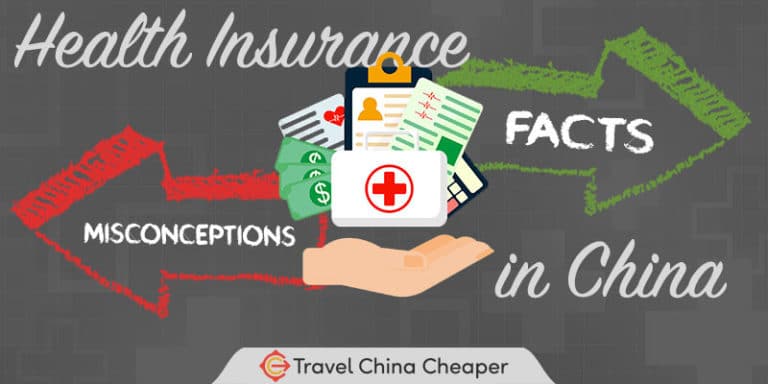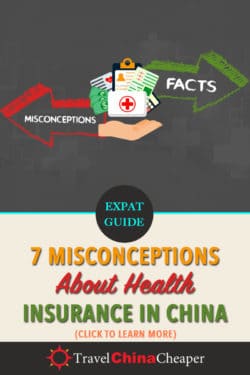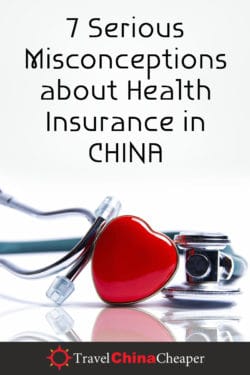How does health insurance for China work, especially in light of Covid? What are hospitals like in China? If you are traveling or moving to China anytime soon, it is good to have a general understanding of how health insurance for China works, which is exactly what I aim to do here.
Since moving to China, I have seen many foreigners who were either traveling or working here that have encountered some mishap requiring medical attention.
Some mishaps were small. Others were major emergencies. Some of those people had good travel health insurance.
Some didn’t.
The problem I’ve noticed is that most travelers and expats don’t quite understand is or isn’t included with travel insurance in China – or what their Chinese employer gives them. Moreover, there are a number of misunderstandings about health insurance for China that you need to be aware of prior to choosing a plan.
Here’s a quick look at the most common misconceptions about health insurance in China.
*Note: Some of the links in this article are affiliate links, which means that at no extra cost to you, I will receive a small commission if you decide to use some of these services. That said, I personally use health insurance and although you should consult professionals to determine exactly what you need, I don’t recommend any service or company that I haven’t used before.
1. My Home Country Insurance Covers Me (Not Always!)
Sometimes your home health insurance covers you for travel overseas. But that’s not always the case, and even when it does, it’s not always the best coverage.
While the best thing you can do is call your personal health insurance company to answer this question, it is likely that your primary health insurance in your home country only offers you minimal coverage while overseas.
There are a couple major questions that you need to ask when you’re talking with your primary health insurance company to figure out what they offer you. These question include:
- What is Covered? Are sickness, injury, and other emergencies covered while traveling abroad? What about Covid-related hospitalization?
- Reimbursement: If so, how much you will be reimbursed after filing a claim? (and how long will that take?)
- Medical Evacuation: Do they offer evacuation in the case of a major emergency? Emergency evacuations can be extremely expensive and run around $100,000 or more. (if they don’t offer that, consider purchasing separate evacuation insurance)
If your primary health insurance has limited coverage abroad or if it does not include emergency evacuation, consider purchasing travel insurance (read here for more on the best travel insurance companies).
2. Travel Insurance Will Cover Me as a Student/Teacher Abroad (Wrong!)
The purpose of travel insurance is generally to cover folks traveling overseas short-term. Once you have a residence permit or your primary purpose of being in China is no longer travel, your coverage may stop working.
Therefore if you are heading to China to work or study, be sure you are purchasing a health insurance policy that matches your reason for being in China and type of visa. There are many travel insurance companies like World Nomads that are suitable for long-term residents and comprehensive plans by travel insurance companies may cover you if you are in China for more than just travel.
Read the fine print in the terms and conditions and speak with several representatives of your ideal provider to guarantee you will be covered. The last thing you want is pay for an insurance policy only to find that they’re denying your claim because of your type of visa!
3. Chinese Hospitals are Unsafe! (Mostly Wrong)
Generally, no.
If you are in Beijing, Shanghai, or any Tier 1 city, there are Western-standard hospitals with English speaking doctors. Many Chinese hospitals even have Western doctors to cater to the needs of expats. A handful of them accept Western insurance (although you’ll need to check beforehand) while the rest are all covered by excellent health insurance for China.
Chinese-run hospitals are usually safe, especially in Tier 1 and most Tier 2 cities (bascially any city with more than 2 million residents), but they are less advanced and sophisticated than what you might be used to in Western countries. Most foreigners in China likely would not want to undergo a serious medical procedure in a Chinese hospital. It is also very unlikely that there are any English speakers.
If you have a major medical emergency and are hospitalized in a Chinese hospital, you also risk paying large out of pocket sums after maxing out your insurance benefits.
Therefore, to prepare for the chance encounter of a major medical emergency, investing in insurance that covers emergency evacuation back to your home country, or even a nearby country with better healthcare like Thailand, is a smart idea.
4. My Chinese Employer Offers Health Insurance, so I’m Fine! (Not Really!)
Don’t assume that because your Chinese employer provides you with health insurance for China that it is comprehensive. Be sure to ask your employer for the policy (it is doubtful to be written in English) and have a long conversation about what is covered and what is included.
It’s also good to know how much they cover. I spoke with one English teacher here in China and found out that their plan limited them to a maximum 30,000 RMB payout per month. That’s only US$5,000! If you know anything about healthcare, you know that $5k doesn’t go far in an emergency situation.
If you work for a company where turnover is high and foreigners come and go regularly, it is likely your employer only invests in minimal health insurance for China coverage. This is especially true if you’re working as an ESL teacher in China with employer insurance.
Even if you have insurance coverage through your Chinese employer, it might be worth looking into whether adding additional coverage would be a right option for you.
5. I’m Already in China…It’s Too Late to Buy Insurance (NO!)
There are many providers like World Nomads that allow you to purchase a policy when already overseas.
Don’t think you must miss out on coverage if you are just now learning you need health insurance after arriving in China. It’s never too late to get coverage.
It’s never too late to get health insurance for China, UNLESS…
…unless you’ve already experienced a medical mishap. In that case, don’t assume that you can purchase coverage and get reimbursed for medical expenses already incurred. You can’t.
That’s why you need to get on the ball NOW.
6. My Pre-Existing Conditions Would Never Be Covered (Maybe)
Coverage on pre-existing conditions varies from policy to policy. There are plenty of insurance companies that cover pre-existing conditions under comprehensive plans, such as the aforementioned World Nomads.
Review the FAQ page of your intended provider and see if and under what circumstances you would be covered for a pre-existing condition. Give them a call and talk to a representative to see if your pre-existing medical condition is covered. You might be pleasantly surprised!
Oh, and whatever you do, make sure you stay safe while traveling in China!
7. Health Insurance Doesn’t Exist for Seniors in China (It Does!)
While it is more difficult for seniors (60+ years old) to acquire quality travel insurance for China, there are a number of providers that cover seniors.
When evaluating plans that cover seniors, it is best to thoroughly review the coverage and talk with an agent under what circumstances your plan does and does not protect you.
Final Thoughts | Health Insurance in China
Don’t let confusion keep you from doing what needs to be done to protect yourself with good travel health insurance for China in 2023. Honestly, especially with everything happening with Covid, it’s stupid not to do so and here are 9 good reasons why.
Next steps for you would be to dive into a number of different insurance plans offered by different providers. To get a deeper dive into specifics, you can learn more about travel insurance and a plan that is best for you.
Were there any other misunderstandings on health insurance that I did not cover above? Let me know in the comments.












Leave a Reply